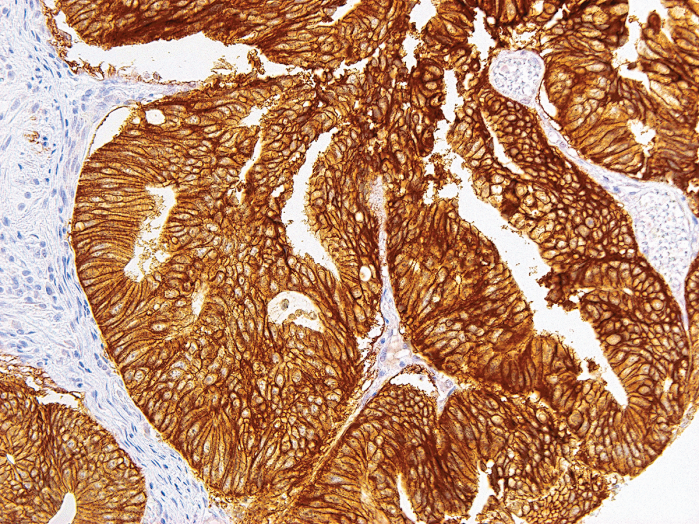Anti-EpCAM (CD326) (Hu) from Mouse (IHC567) – unconj.

-
Overview
SKU AB-180504 Specificity Species Reactivity Host Species Isotype Clone Clonality (Mono-/Polyclonal) Application ELISA, Immunohistochemistry (IHC), Immunohistochemistry (Paraffin-embedded Sections)
Conjugation Dilution Format < 0.1% NaN3, 1% BSA, concentrate, in Tris buffer (pH 7.3-7.7), ProteinA/G purified antibody
Intended Use Temperature - Storage Temperature - Transport Manufacturer / Brand Uniprot_ID Gene_ID Alias Adenocarcinoma-associated antigen, CD326, EGP, EPCAM, Epithelial Cell Adhesion Molecule, Epithelial glycoprotein, HEGP2, KSA, Lung carcinoma Cluster 2, M4S1, MIC18, TACSTD1, TROP1, Tumor Associated Calcium Signal Transducer 1
- Datasheets and Downloads
-
Additional Product Information
Epithelial Cell Adhesion Molecule (EpCAM) is a transmembrane glycoprotein that mediates cell-cell adhesion in epithelia. It is normally present on most baso-lateral surfaces of normal epithelial cells and is absent in myoepithelial cells, hepatocytes, adult squamous epithelia, mesothelial cells, and fibroblasts. Anti-EpCAM stains most adenocarcinomas and neuroendocrine tumours, including small cell carcinomas. A minority of renal clear cell carcinoma, renal oncocytoma, and hepatocellular carcinoma stain positively for EpCAM, while Anti-EpCAM stains nearly all basal cell carcinoma. Anti-EpCAM stains chromophobe renal cell carcinoma, papillary renal cell carcinoma, and cholangiocarcinoma more frequently. Anti-EpCAM can be useful for distinguishing malignancy in the peritoneal and pleural cavities.
-
Images

Immunohistochemical staining of formalin-fixed and paraffin-embedded (FFPE) human colon tissue section using anti-EpCAM (Epithelial Specific Antigen, CD326) mouse monoclonal antibody (Clone IHC567).
Contact
